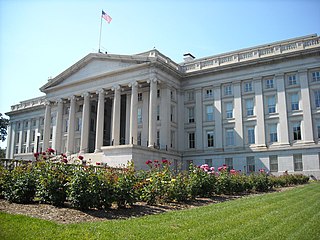Related Research Articles

The Economic Recovery Tax Act of 1981 (ERTA), or Kemp-Roth Tax Cut, was an Act that introduced a major tax cut, which was designed to encourage economic growth. The federal law enacted by the 97th US Congress and signed into law by US President Ronald Reagan. The Accelerated Cost Recovery System (ACRS) was a major component of the Act and was amended in 1986 to become the Modified Accelerated Cost Recovery System (MACRS).

Ireland's Corporate Tax System is a central component of Ireland's economy. In 2016–17, foreign firms paid 80% of Irish corporate tax, employed 25% of the Irish labour force, and created 57% of Irish OECD non-farm value-add. As of 2017, 25 of the top 50 Irish firms were U.S.–controlled businesses, representing 70% of the revenue of the top 50 Irish firms. By 2018, Ireland had received the most U.S. § Corporate tax inversions in history, and Apple was over one–fifth of Irish GDP. Academics rank Ireland as the largest tax haven; larger than the Caribbean tax haven system.
Tax consolidation, or combined reporting, is a regime adopted in the tax or revenue legislation of a number of countries which treats a group of wholly owned or majority-owned companies and other entities as a single entity for tax purposes. This generally means that the head entity of the group is responsible for all or most of the group's tax obligations. Consolidation is usually an all-or-nothing event: once the decision to consolidate has been made, companies are irrevocably bound. Only by having less than a 100% interest in a subsidiary can that subsidiary be left out of the consolidation.
A tax incentive is an aspect of a country's tax code designed to incentivize or encourage a particular economic activity by reducing tax payments for a company in the said country.
A tax haven is a country or place with very low "effective" rates of taxation for foreign investors. In some traditional definitions, a tax haven also offers financial secrecy. However, while countries with high levels of secrecy but also high rates of taxation, most notably the United States and Germany in the Financial Secrecy Index ("FSI") rankings, can be featured in some tax haven lists, they are not universally considered as tax havens. In contrast, countries with lower levels of secrecy but also low "effective" rates of taxation, most notably Ireland in the FSI rankings, appear in most § Tax haven lists. The consensus on effective tax rates has led academics to note that the term "tax haven" and "offshore financial centre" are almost synonymous.

A tax inversion or corporate tax inversion is a form of tax avoidance where a corporation restructures so that the current parent is replaced by a foreign parent, and the original parent company becomes a subsidiary of the foreign parent, thus moving its tax residence to the foreign country. Executives and operational headquarters can stay in the original country. The US definition requires that the original shareholders remain a majority control of the post-inverted company.

The Double Irish was a base erosion and profit shifting (BEPS) corporate tax tool used mostly by US multinationals since the late 1980s to avoid corporate taxation on non-U.S. profits. It was the largest tax avoidance tool in history and by 2010 was shielding US$100 billion annually in US multinational foreign profits from taxation, and was the main tool by which US multinationals built up untaxed offshore reserves of US$1 trillion from 2004 to 2018. Traditionally, it was also used with the Dutch Sandwich BEPS tool; however, changes to Irish tax law in 2010 dispensed with this requirement.
Formulary apportionment, also known as unitary taxation, is a method of allocating profit earned by a corporation or corporate group to a particular tax jurisdiction in which the corporation or group has a taxable presence. It is an alternative to separate entity accounting, under which a branch or subsidiary within the jurisdiction is accounted for as a separate entity, requiring prices for transactions with other parts of the corporation or group to be assigned according to the arm's length standard commonly used in transfer pricing. In contrast, formulary apportionment attributes the corporation's total worldwide profit to each jurisdiction, based on factors such as the proportion of sales, assets or payroll in that jurisdiction.

Base erosion and profit shifting (BEPS) refers to corporate tax planning strategies used by multinationals to "shift" profits from higher-tax jurisdictions to lower-tax jurisdictions, thus "eroding" the "tax-base" of the higher-tax jurisdictions. The Organisation for Economic Co-operation and Development (OECD) define BEPS strategies as "exploiting gaps and mismatches in tax rules".
Companies of the United States with untaxed profits deals with those U.S. companies whose offshore subsidiaries earn profits which are retained in foreign countries to defer paying U.S. corporate tax. The profits of United States corporations are subject to a federal corporate tax rate of 21%. In principle, the tax is payable on all profits of corporations, whether earned domestically or abroad. However, overseas subsidiaries of U.S. corporations are entitled to a tax deferral of profits on active income until repatriated to the U.S., and are regarded as untaxed. When repatriated, the corporations are entitled to a foreign tax credit for taxes paid in foreign countries.

Bermuda black hole was an historical term given to the final destination for untaxed global profits of corporate base erosion and profit shifting (BEPS) tax avoidance schemes which ended up in Bermuda, which is considered a tax haven. The term was most associated with US technology multinationals such as Apple and Google who used Bermuda as the "terminus" for their Double Irish arrangement tax structure.
The OECD G20 Base Erosion and Profit Shifting Project is an OECD/G20 project to set up an international framework to combat tax avoidance by multinational enterprises ("MNEs") using base erosion and profit shifting tools. The project, led by the OECD's Committee on Fiscal Affairs, began in 2013 with OECD and G20 countries, in a context of financial crisis and tax affairs. Currently, after the BEPS report has been delivered in 2015, the project is now in its implementation phase, 116 countries are involved including a majority of developing countries. During two years, the package was developed by participating members on an equal footing, as well as widespread consultations with jurisdictions and stakeholders, including business, academics and civil society. And since 2016, the OECD/G20 Inclusive Framework on BEPS provides for its 137 members a platform to work on an equal footing to tackle BEPS, including through peer review of the BEPS minimum standards, and monitoring of implementation of the BEPS package as a whole.

The economic policy of the Donald Trump administration was characterized by the individual and corporate tax cuts, attempts to repeal the Affordable Care Act ("Obamacare"), trade protectionism, immigration restriction, deregulation focused on the energy and financial sectors, and responses to the COVID-19 pandemic.
A destination-based cash flow tax (DBCFT) is a form of border adjustment tax (BAT) that was proposed in the United States by the Republican Party in their 2016 policy paper "A Better Way — Our Vision for a Confident America", which promoted a move to the tax. It has been described by some sources as simply a form of import tariff, while others have argued that it has different consequences than those of a simple tariff.

The Tax Cuts and Jobs Act of 2017 (TCJA) is a congressional revenue act of the United States signed into law by President Donald Trump which amended the Internal Revenue Code of 1986. Major elements of the changes include reducing tax rates for businesses and individuals, increasing the standard deduction and family tax credits, eliminating personal exemptions and making it less beneficial to itemize deductions, limiting deductions for state and local income taxes and property taxes, further limiting the mortgage interest deduction, reducing the alternative minimum tax for individuals and eliminating it for corporations, reducing the number of estates impacted by the estate tax, and cancelling the penalty enforcing individual mandate of the Affordable Care Act (ACA).

On 29 August 2016, after a two-year investigation, Margrethe Vestager of the European Commission announced: "Ireland granted illegal tax benefits to Apple". The Commission ordered Apple to pay €13 billion, plus interest, in unpaid Irish taxes from 2004–14 to the Irish state. It was the largest corporate tax "fine" in history. On 7 September 2016, the Irish State secured a majority in Dáil Éireann to reject payment of the back-taxes, which including penalties could reach €20 billion, or 10% of 2014 Irish GDP. In November 2016, the Irish government formally appealed the ruling, claiming there was no violation of Irish tax law, and that the commission's action was "an intrusion into Irish sovereignty", as national tax policy is excluded from EU treaties. In November 2016, Apple CEO Tim Cook, announced Apple would appeal, and in September 2018, Apple lodged €13 billion to an escrow account, pending appeal. In July 2020, the European General Court struck down EU tax decision as illegal, ruling in favor of Apple.

The Republic of Ireland has been labelled as a tax haven or corporate tax haven by multiple financial reports, an assertion which the state denies. In 2021 the Tax Justice Network ranked Ireland 11th in its list of enablers of global corporate tax abuse. Ireland's base erosion and profit shifting (BEPS) tools give some foreign corporates § Effective tax rates of 0% to 2.5% on global profits re-routed to Ireland via their tax treaty network. Ireland's aggregate § Effective tax rates for foreign corporates is 2.2–4.5%. Ireland's BEPS tools are the world's largest BEPS flows, exceed the entire Caribbean system, and artificially inflate the US–EU trade deficit. Ireland's tax-free QIAIF & L–QIAIF regimes, and Section 110 SPVs, enable foreign investors to avoid Irish taxes on Irish assets, and can be combined with Irish BEPS tools to create confidential routes out of the Irish corporate tax system. As these structures are OECD–whitelisted, Ireland's laws and regulations allow the use of data protection and data privacy provisions, and opt-outs from filing of public accounts, to obscure their effects. There is arguable evidence that Ireland acts as a § Captured state, fostering tax strategies.
James R. Hines Jr. is an American economist and a founder of academic research into corporate-focused tax havens, and the effect of U.S. corporate tax policy on the behaviors of U.S. multinationals. His papers were some of the first to analyse profit shifting, and to establish quantitative features of tax havens. Hines showed that being a tax haven could be a prosperous strategy for a jurisdiction, and controversially, that tax havens can promote economic growth. Hines showed that use of tax havens by U.S. multinationals had maximized long-term U.S. exchequer tax receipts, at the expense of other jurisdictions. Hines is the most cited author on the research of tax havens, and his work on tax havens was relied upon by the CEA when drafting the Tax Cuts and Jobs Act of 2017.

An international minimum corporate tax rate is a proposal to reduce tax competition between countries and the avoidance of corporate taxes.
Pseudo-reorganization acquisitions are acquisitions that are done in order to repatriate income earned by foreign subsidiaries to a parent corporation while avoiding taxes ordinarily owed on the repatriation of foreign income in countries with a worldwide system of taxation. Prior to the passage of the Tax Cut and Jobs Act of 2017, multinational firms based in the United States avoided taxes on the repatriation of income earned abroad through the use of pseudo-reorganization acquisitions.
References
- 1 2 3 Martin A. Sullivan, Corporate Tax Reform: Taxing Profits in the 21st Century, p. 83, ISBN 143023928X.
- ↑ Linnane, Ciara (December 10, 2016). "Trump's tax holiday won't make much of a difference without corporate-tax reform". MarketWatch.
- ↑ Kristina Peterson, "Report: Repatriation Tax Holiday a 'Failed' Policy", Wall Street Journal (October 10, 2011).